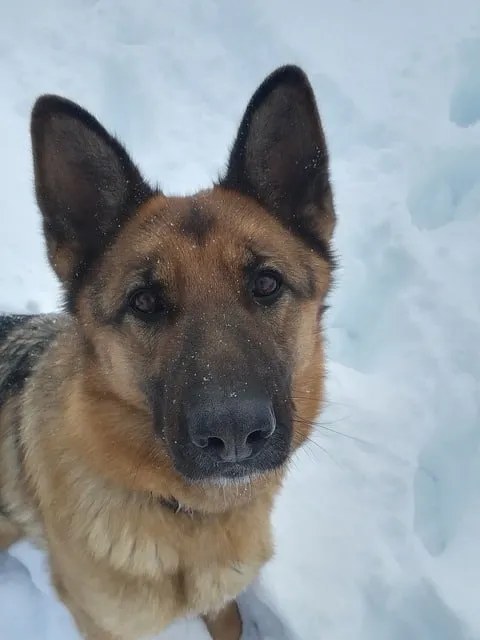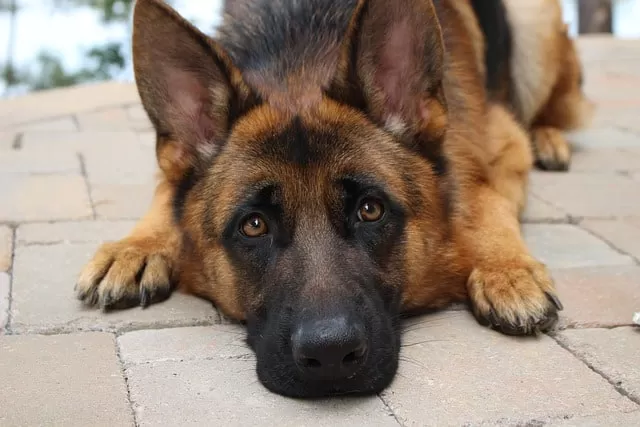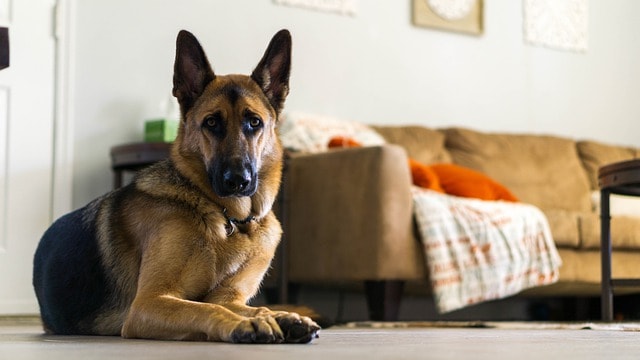The German Shepherd is a large breed of dog with German roots who was originally known as the Alsatian in many areas of Europe.
German shepherds are intelligent, loyal, fun-loving dogs and totally devoted to their families.
The last part about devotion can sometimes come off in a bad or good way. Many people are put off by these large dogs because of their size, their big bark, and because they are very protective, especially to the people they are devoted to.
Because of their herding instinct, they are often misunderstood by many because they are viewed as fearful and aggressive.
Their protective mode sometimes causes anxiety in these breeds and they can also suffer from separation anxiety even as puppies.
Any breed can suffer from anxiety. Anxiety in German shepherd puppies can be helped if you understand the cause and know how to help.
Nipping it in the bud early before it gets out of hand and causes other problems is necessary.
In the reading below, I will answer the question, what are signs of anxiety in dogs? You will learn about different types of anxiety in shepherd puppies and also how to help a German shepherd puppy deal with separation anxiety.

For your dog’s vitamin supplement, foods, toys, or other dogs product please visit the Sundays for dogs website.
Anxiety in German Shepherd Puppies
When you think of puppies, you think of fluffy, happy balls of fur, running and rolling around, and having wonderful playtime. This is mostly the case but just as you or I can suffer from anxiety, so can puppies.
The time to help German shepherd puppies overcome anxiety is when they are small. Once they become an adult, it becomes harder to deal with.
Puppies should never be taken from their mother until they are at least 12 weeks old. Taking them earlier will result in anxiety and possibly behavioral problems.
They need social interaction with their mother and littermates. Their mother nurtures them and teaches important social skills to their brothers and sisters.
When you bring your German shepherd puppy home you should begin to socialize them with people and other dogs (after their first rabies shot) if possible.
Socialization is very important in the first 16 to 18 weeks of their life or your pup can develop social anxiety.
If puppies aren’t socialized properly, it leaves the door open for aggression, fear, and anxiety as they grow.
Along with social anxiety, puppies can suffer from noise anxiety. Most puppies are oblivious to noises but some may be startled by the slam of a door, a vacuum cleaner, and thunder.
Many dogs are extremely sensitive to thunderstorms and become agitated and anxious, at times sensing when a storm is approaching before anyone else hears it. Some pups are not fazed by storms while others are panicking and very hard to calm.
Separation anxiety is most common and can also be exhibited in German shepherd puppies. A puppy, they are first separated from its mother and littermates.
If you bring them home and then leave for work or errands, they are all alone and may become anxious and afraid.
Crating is best for puppies when you must leave them home alone. Separation anxiety can be unfortunate for puppies.
This sometimes causes owners to give up their pup if they return home and their house is in shambles from a mess their pup made.
They were alone, scared, and anxious and their owner did not keep them contained in one area for their safety.
This is a shame because the situation could have been remedied quite easily with some boundaries, training, love, and time.
To check your German Shepherd puppy’s health status or their DNA, please visit the Embark vet website for all the help you may need.

Signs of Anxiety in Dogs.
Some common signs of anxiety are listed below.
- Panting.
- Restlessness and jittery.
- Loss of appetite.
- Does not interact.
- Ears are back.
- Destructive behavior.
- Whining, barking, howling.
- Snapping and/or biting.
- Baring teeth and/or growling.
Social anxiety symptoms
- Fearful.
- Timid.
- Aggressive.
Noise anxiety symptoms
- Bark or whine.
- Seem frozen in one area.
- Shake or shiver.
- Constant pacing and unable to settle.
Separations anxiety symptoms
- Crying, whining, barking.
- Defecating and/ or urinating.
- Shredding, chewing (furniture, rugs, carpet, etc.).
- Scratching walls, door frames, floor, etc.
- Dumping Garbage.
Causes of Anxiety.
- Separation Anxiety
If the only time your pup is anxious is when you leave them alone then the problem is easy to pinpoint. It is very common for German shepherd puppies to suffer from separation anxiety.
They feel lonely and afraid and sometimes cause destruction because they feel panicked and sometimes are searching for a way to escape, causing messes and often hurting themselves in the process. This is why it needs to be dealt with before they get too old.
- Stressful household
If you are anxious yourself or if the stress level in your household is always on high alert, your German shepherd puppy will pick up on this causing anxiety and a very high-strung pup.
- Fear
Fear can cause anxiety whether it is fear of another person, cat or dog, or even thunder, sirens fireworks, etc.
- New schedule
If your pup is used to the routine and it’s suddenly thrown off and changed with a new job, children in school, etc.
- New home, baby a death
Anything new or even a missing family member caused by a death or someone going off to college can cause anxiety.
- Abuse
If you’ve adopted a shepherd puppy, and they were mistreated or abused, they may have anxiety or other behavioral issues.

How To Help A German Shepherd Puppy Deal With Anxiety and Separation Anxiety.
As a puppy, exposing your German shepherd to many sights, sounds, smells, people, places and other dogs can help immensely in avoiding any anxiety issues or halting any problems they have already.
Proper training is also the key so they learn that you are not only the boss but they can look to you for guidance in any situation.
If you meet someone on the street and begin talking, your pup will look at you and see that you’ve accepted this person and they will too without showing aggression or protectiveness. Proper training goes a long way in avoiding most behavioral issues.
Desensitization is a method of helping your pup overcome anxiety and fear in social situations. Slowly introduce them to different people and friendly dogs.
Give them praise for calmness and acceptance and they will soon come around. Take time with these situations, so as not to overwhelm your shepherd with too many new things at once.
Helping your German shepherd with noise anxiety may be a bit more difficult. Try not to expose them to noises they fear if at all possible. Put them in a separate room or in their own safe spot if they’re afraid of the vacuum.
Don’t give them rewards or praise for staying calm or any attention, just act normal and keep things light. If you have problems helping them, seek out your veterinarian for advice.
For preventing and helping curb separation anxiety, begin with prevention. Begin by leaving your puppy alone but for only short periods of time at first.
You should use a crate or a gated room and this will become their own space and their “safe” spot, complete with bed, blanket, toys, food, and water.
Puppies should never be given full run of the house even when you are at home.
Do not drag out goodbyes and make a big deal when you are leaving the house because doing this will clue them in every time you are about to leave, causing anxiety.
When returning, don’t make a big fuss. Go about your business, put things away, open mail, etc., and then greet them after a few minutes.
If with any anxiety disorder in your puppy, you feel that it’s clearly out of your league, contact your vet for help.
Often they will have some great advice or some short-term medication may be necessary. There also are many very good holistic supplements available.
Just remember that your German shepherd puppy may create a mess that has nothing to do with anxiety.
Puppies are, in fact, puppies, and they are very playful and messy. Training, however, is essential, so the puppy learns right from wrong.
If your puppy has anxiety problems, keep in mind, this behavior has nothing to do with spite or anger, they are just anxious and afraid and don’t understand how to control their feelings. Time, patience, and love go a long way and any form of anxiety is treatable.